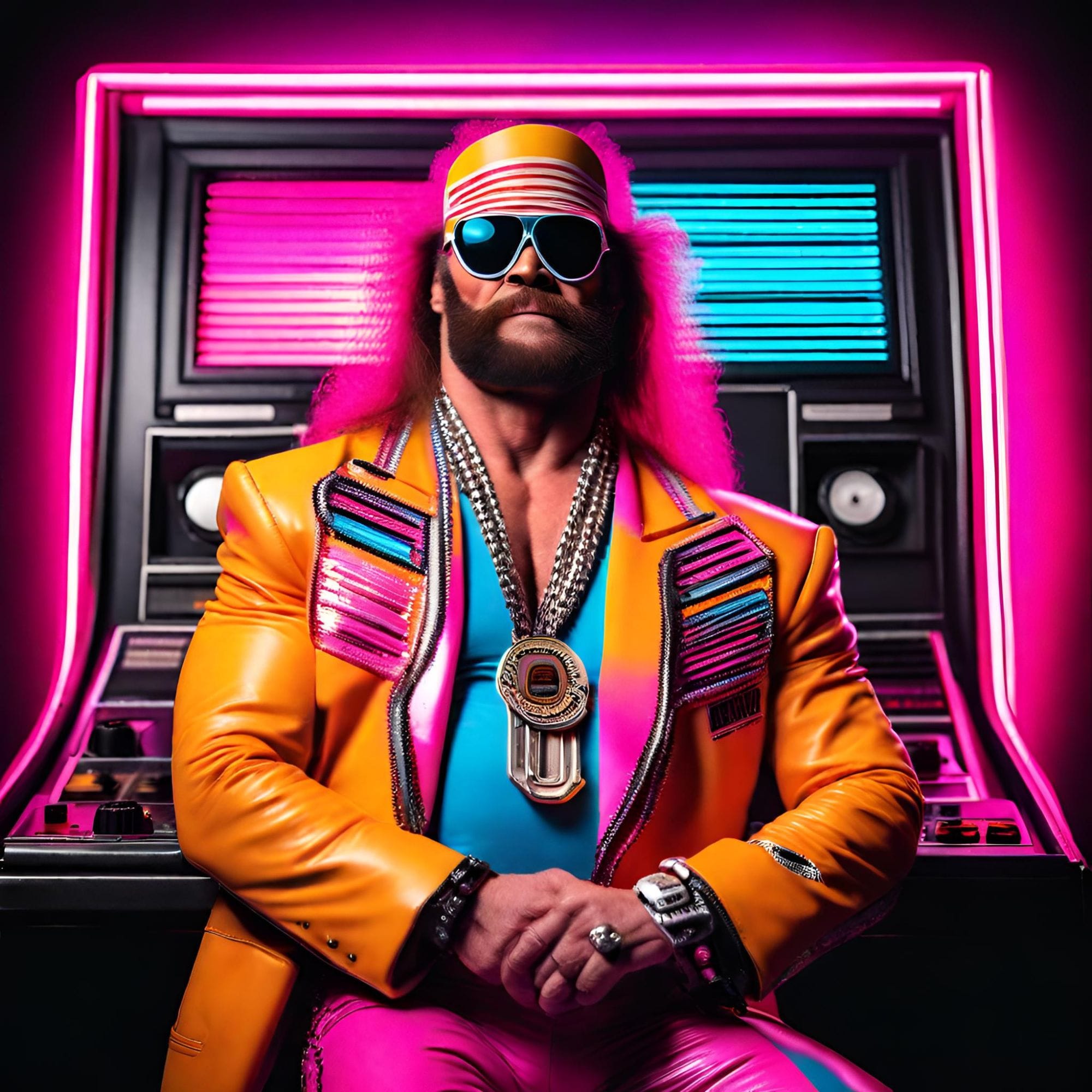








buymeacoffee.com coming soon..
Introduction
In the world of professional wrestling, few names evoke as much excitement and nostalgia as The Macho Man Randy Savage. With his flamboyant style, larger-than-life personality, and incredible athleticism, Savage captivated audiences around the world during his illustrious career. However, as time passed, the once-ubiquitous Macho Man seemingly disappeared from the spotlight, leaving fans wondering what happened to their beloved wrestling icon.
This article delves into the life and career of Randy Savage, exploring the highs and lows that accompanied his journey in and out of the wrestling ring. From his early days as a promising athlete to his rise to fame as one of the most recognizable figures in the industry, Savage's story is one of triumph and tragedy.
Background of The Macho Man Randy Savage
Early Life and Career Beginnings
Born Randall Mario Poffo on November 15, 1952, in Columbus, Ohio, The Macho Man Randy Savage would go on to become one of the most iconic figures in professional wrestling history. Growing up in a family with a strong wrestling background, it was no surprise that Savage would find his calling in the squared circle.
Savage's father, Angelo Poffo, was a well-known wrestler and promoter, and his brother, Lanny Poffo, also pursued a career in the wrestling industry. From a young age, Savage was exposed to the world of wrestling and developed a deep passion for the sport.
In his late teens, Savage's family moved to Sarasota, Florida, where he attended Sarasota High School. It was during his time there that he began to showcase his athletic prowess and natural talent. Savage excelled in various sports, including baseball and football, but it was his love for wrestling that took center stage.
Wrestling Success and Rise to Fame
In the early 1970s, Savage started his professional wrestling career in the regional territories, honing his skills and developing his flamboyant persona that would later define him. He adopted the moniker "Macho Man" and quickly became known for his high-flying maneuvers, intense in-ring style, and charismatic personality.
Savage's breakthrough came when he joined the World Wrestling Federation (WWF, now WWE) in 1985. It was there that he truly embraced his Macho Man persona, complete with his signature colorful attire and trademark sunglasses. Savage's incredible athleticism and captivating promos quickly made him a fan favorite.
During his time in the WWF, Savage achieved numerous accolades. He won the Intercontinental Championship on two occasions, engaging in memorable feuds with the likes of Ricky "The Dragon" Steamboat and Tito Santana. But it was his reign as the WWF World Heavyweight Champion in 1988 that solidified his standing as one of the all-time greats. Savage's epic match against Hulk Hogan at WrestleMania V is still regarded as one of the most iconic matches in wrestling history.
Pop Culture Icon and Catchphrases
Beyond his in-ring success, The Macho Man Randy Savage transcended the world of wrestling to become a pop culture phenomenon. His larger-than-life personality and unique catchphrases, such as "Ooh yeah!" and "Snap into a Slim Jim!", became synonymous with his character and resonated with fans around the world.
Savage's popularity extended beyond the wrestling ring, as he made appearances in movies and television shows. He starred in the 2002 film "Spider-Man" as the wrestler Bonesaw McGraw, leaving an indelible mark on the superhero genre.
The Macho Man Randy Savage's impact on popular culture cannot be understated. His distinctive voice, flamboyant attire, and charismatic persona made him an instantly recognizable figure, even to those who were not avid wrestling fans.
Retirement and Post-Wrestling Life
Transition to Commentary and Acting
After years of dominating the squared circle, The Macho Man Randy Savage decided to step away from the physical demands of professional wrestling. However, retirement did not mean he would fade into obscurity. Instead, Savage sought new avenues to showcase his talent and entertain his legions of fans.
One of the first post-wrestling ventures Savage embarked on was a transition to commentary. His distinctive voice and charismatic personality made him a natural fit for this role. Savage joined World Championship Wrestling (WCW) in 1995 as a color commentator, lending his unique perspectives and colorful commentary to matches. His dynamic presence behind the microphone added an extra layer of excitement to the broadcasts, and he quickly became a fan favorite in this new role.
In addition to his commentary duties, Savage also ventured into the world of acting. He made appearances in television shows such as "Walker, Texas Ranger" and "Baywatch," showcasing his versatility beyond the wrestling ring. Savage's larger-than-life persona translated well to the screen, and his charisma continued to captivate audiences.
Health Issues and Personal Challenges
While Savage's career outside of wrestling was flourishing, he faced his fair share of health issues and personal challenges. Throughout his wrestling career, Savage pushed his body to the limit, subjecting himself to intense physicality and high-risk maneuvers. These years of wear and tear took a toll on his health, leading to chronic pain and requiring multiple surgeries.
Tragically, on May 20, 2011, Savage's life was cut short when he suffered a heart attack while driving in Florida. He lost control of his vehicle and crashed into a tree. The wrestling world mourned the loss of one of its most iconic figures, and fans around the globe expressed their grief over the untimely passing of The Macho Man.
Legacy and Influence
Despite his untimely passing, The Macho Man Randy Savage's legacy continues to endure. He left an indelible mark on the world of professional wrestling, forever etching his name in the annals of sports entertainment history. Savage's flamboyant personality, intense in-ring style, and memorable catchphrases made him an unforgettable character, beloved by fans of all generations.
His influence can be seen in the countless wrestlers who have attempted to emulate his larger-than-life persona and captivating in-ring performances. Savage's impact extends beyond the wrestling world, as his charismatic presence and unique style have left an imprint on popular culture as a whole.
Conclusion
In conclusion, The Macho Man Randy Savage's retirement marked the beginning of a new chapter in his life. He successfully transitioned into commentary and acting, bringing his infectious energy to new platforms. However, his post-wrestling journey was not without challenges, as he battled health issues and faced a tragic end. Yet, his lasting legacy as a pop culture icon and his unparalleled influence on the wrestling industry will forever cement his place as one of the all-time greats.
The Macho Man Randy Savage was a larger-than-life figure in the world of professional wrestling. From his humble beginnings to his meteoric rise to fame, Savage captured the hearts of fans worldwide with his unique blend of charisma, athleticism, and showmanship.
Throughout his career, Savage left an indelible mark on the wrestling industry. His memorable matches, intense rivalries, and iconic catchphrases continue to be celebrated to this day. His larger-than-life persona made him a pop culture icon, transcending the boundaries of the wrestling ring and reaching a wider audience.
However, as with many legends, Savage's wrestling career eventually came to an end. Following his retirement, he ventured into commentary and acting, showcasing his versatility and further cementing his place in the entertainment world. Despite experiencing health issues and personal challenges, Savage remained resilient and continued to inspire others with his determination and passion.
Today, Randy Savage's legacy lives on. His impact on the wrestling industry is undeniable, and his influence can be seen in the careers of countless wrestlers who followed in his footsteps. His larger-than-life persona and dedication to his craft have left an enduring imprint on the hearts and minds of fans worldwide.
While we may never truly know what happened to The Macho Man Randy Savage in his final years, what we do know is that he will forever be remembered as a wrestling legend. His contributions to the industry, his unforgettable moments in the ring, and his enduring legacy ensure that his name will continue to be spoken with reverence and admiration.
In the end, The Macho Man Randy Savage's story is one of triumphs, tribulations, and a larger-than-life persona that captured the imaginations of wrestling fans around the globe. His impact on the industry and his lasting legacy will forever be etched in the annals of professional wrestling history.





